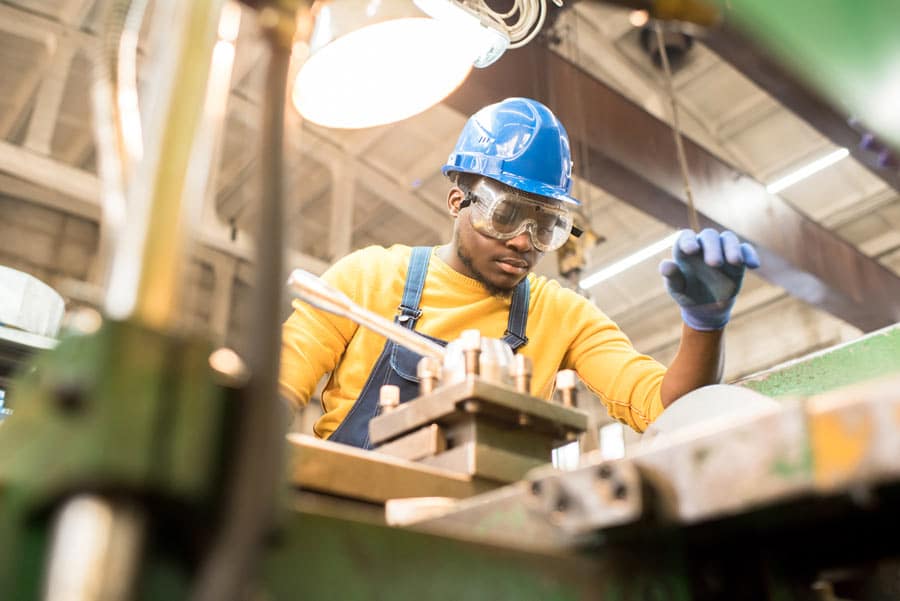Amid stormy economic conditions, power cuts, and striking transport workers, coming up with profitable manufacturing business ideas in South Africa may seem like an impossible dream.
SA manufacturing businesses must contend with a wide range of issues that have dogged the country in recent years as they map out the logistics of their own ventures.
Businesses new to the game must also contend with established industrial companies in South Africa if they are to carve a niche for themselves in a competitive market.
Yet, despite these challenges, the South African manufacturing industry has proved to be surprisingly robust in recent years.
Stats from the South African government show that manufacturing was the fastest growing national industry at the turn of the year with steady growth since, including a 3.6% and 2.5% in April and May respectively.

These figures point to a manufacturing industry that holds bags of potential for both established companies and enterprising business people with a smart idea.
But how to come up with these innovative business ideas that make a successful venture?
Read on to find out which lucrative business ideas some of South Africa’s best manufacturing operations work in, as well as some expert advice on how they are making them work.
Want to take action with a manufacturing idea but struggling for funding to make it happen? Open a Lula bank account today for fast access to flexible business funding from SA’s first dedicated SME banking platform.
Which manufacturing business is most profitable in South Africa?
Pinning down the most profitable business idea in manufacturing is difficult as there are various ways of measuring success. However, some manufacturing sectors have shown consistent growth and profitability over time, and continue to do so today.
In 2019, government data company Statistics South Africa carried out research into the most profitable manufacturing sectors in the country according to their contribution to the economy.
Food and beverages came out top, supplying just over a quarter of the national value, while petroleum and chemical products followed closely behind with 24% and basic iron and steel made up 19%.

Since the pandemic, and the record drop in productivity levels, the same industries have helped to power an economic bounce-back.
According to the same data firm, metal (i.e. iron and steel) production grew by 5.3% between April 2022 and April 2023, with motor vehicles (5%), food processing and beverages (4.6%), and petroleum and chemical products (2.8%) also posting substantial growth figures.
Clearly, these are the industries those interested in manufacturing in South Africa should explore.
But, what is it about these industries (and those related to them) that makes them such a smart option for manufacturing business ideas in South Africa? And which ones are the rising stars to look out for in the SA manufacturing sector?
Manufacturing business ideas in South Africa: 7 profitable industries to look at
When it comes to launching a new manufacturing business project in South Africa, it pays to know if your chosen industry is likely to provide you with the returns that you’re hoping for.
A high demand is one major factor; scalability is another. Entering an industry with plenty of potential customers and room to grow means small-scale startups often rapidly become large-scale enterprises.
In an interview with the SME South Africa publication, Lebo Raolane, Senior Investment Associate at Old Mutual’s Masisizane Fund, added a third factor: “Think about where you can add value”, he says.
Often business owners rush into a new sector to try and compete with the big players, but the most rapid risers are often those who find a niche within the industry and innovate.
With that in mind, here are the seven SA manufacturing industries with the most potential right now, and how you might be able to forge new business opportunities within them.
1. Solar power
Necessity is the mother of invention, as the South African solar industry is finding out.
Loadshedding, the controlled power outages to reduce strain on the national grid at times of high demand, has pushed up demand for solar power installations in South Africa. In the first five months of 2022 alone, the country imported R2.2 billion worth of PV solar panels, prompting prime minister Cyril Ramaphosa to pledge to cut through red tape to boost South Africa’s use of renewable energy.
With demand for alternative energy as high as it’s ever been, innovators are looking for better products, so if you have a creative eye, this might be the sector for you.
“Africa is unlocking solar manufacturing to provide affordable and sustainable electricity not only to rural communities but also to commercial and industrial segments”, says Lebo Raolane, the expert mentioned earlier. “This could be the most profitable consideration in the manufacturing sector.”
(Solar manufacturing) could be the most profitable consideration in the manufacturing sector
Lebo Raolane Senior Investment Associate at Old Mutual’s Masisizane Fund
The rewards are potentially huge for manufacturing businesses in South Africa that come up with a market-ready solar power product that’s available at an affordable price. “The goal is that every single household no longer stresses about where the next hot meal is coming from,” says Raolane, “it would be an enormous achievement”
2. Food and beverages
When thinking up your next successful business idea, beverages and food items may not be the first thing you think of, but it’s an industry that’s among the most robust in South Africa.
Soft drinks in particular offer a lucrative opportunity. The consumption rate is very high in South Africa, where they’re more popular than alcohol.
What’s more, starting a drinks business is not capital intensive as equipment costs are much lower than in other industries. Low space requirements mean business people often start the business from home.
To start, you’ll need to register with the CIPC and pay close attention to excise and environmental laws.
Lebo Raolane also recommended another factor: “You need to know the agriculture input well”, he says, meaning sourcing high-quality ingredients and having strong relationships with local farmers and suppliers is also key.
3. Earth wire
An earth wire production venture has the potential to be one of the most lucrative manufacturing business ideas not just in South Africa, but across the entire African continent.
Earth wires ensure the safety and stability of electrical systems across various industries, from small-scale manufacturing to grand ventures like automotive production lines.
To excel in this industry, South African business people should focus on identifying specific market gaps or unmet needs within the electrical safety sector.
Getting involved with the creation of niche applications that need earth wiring, such as renewable energy projects or specialised industrial machinery, can create a competitive advantage.
4. Glass
What’s the easiest thing to manufacture? Many experts say glass.
Glass is a profitable industry in South Africa thanks to its versatility and low-cost natural resources, including sand, soda ash, and limestone.
We find glass in countless finished products, from windows to drinks bottles, so there’s always demand for it.
Yet, the manufacturing process can involve quite a lot of energy consumption and specialised equipment, so businesses will have to smartly handle these two main costs if they are to quickly make glass a profitable venture.
Glass-making machines, typically sourced from China or India, are one economical way of achieving this.
5. Cosmetic products
The rise in the sale of chemical products across the country has helped the healthcare and cosmetics markets grow consistently over the past decade.
Growing demand for skincare, fragrance, and hair products has seen the industry expand to a value of $4.18 billion (R79 bn) in 2023, set to rise to $5 bn (R94.5bn) by 2028.

Finding a unique niche in this market, rather than taking a scattergun approach, is more likely to lead to success, and the beauty industry is full of potentially high-selling products.
Anti-ageing creams, sunscreen, and lip balm are all quality products that generate high sales in a society where self-care is a growing priority.
6. Construction materials
A South African construction boom could be just around the corner.
A major public sector investment of over R800 million into the public sector through to 2025 is set to stimulate the building industry as huge road, rail, and housing projects kick off across the country.
Official figures from 2022 show that this is already underway with government-funded projects rising by 159% from 2021, according to SA’s Construction Industry Development Board (CIDB).
With many business people looking at how to launch a construction company, now could be a good time to invest in the bricks, cement, and basic iron and steel needed to supply them.
Yet, newcomers into this sector should also tread with caution. Louis Botha, director of construction company Simply Do, warns that inflation continues to be a long-term threat and that startups must be transparent.
“Do proper costings of work to be undertaken and make sure that clients understand the reasoning behind price increases,” says Botha, “Do not “hide” this from them and present them with a surprise later”.
Good communication with material sourcers is also a necessity, according to the director. “Strong supplier relationships will ensure a timely supply of high-quality materials – and avoid potential issues with unreliable or unverified suppliers”.
Strong supplier relationships will ensure a timely supply of high-quality materials and avoid potential issues with unreliable suppliers
Business owners who prove themselves as trustworthy raw materials providers may find themselves playing a key role in one of the country’s biggest-ever building booms.
7.Machinery
Often business people ask themselves “what business can I start with R50,000?”, and selling machinery is hardly likely to appear high on the list – yet, the truth is you may not need a lot of money, even when dealing with heavy-duty equipment.
Johan Eksteen, a South African businessman, founded Agricon Pelleting to address the unmet need for affordable manufacturing machines for small business in South Africa. His firm became market leader by providing pellet machines to farmers.
Eksteen stresses the need for self-reliance through building cashflow rather than relying on external investment in an interview with the publication “How We Made It In Africa“.
Often businesses dealing in large equipment wait around for traditional banks to give the green light on loans before they start a new venture, without realising that stimulating cash flow and reducing risk associated with it, is an essential first step.
By prioritising monetary flow in this way, business owners can establish a solid financial foundation for their manufacturing business ideas in South Africa, leading to long-term sustainability and success.
Want to better manage cash flow for your business idea without relying on big banks and investors? Sign up to Lula in minutes and get funding within 24 hours with SA’s first dedicated SME banking platform.



